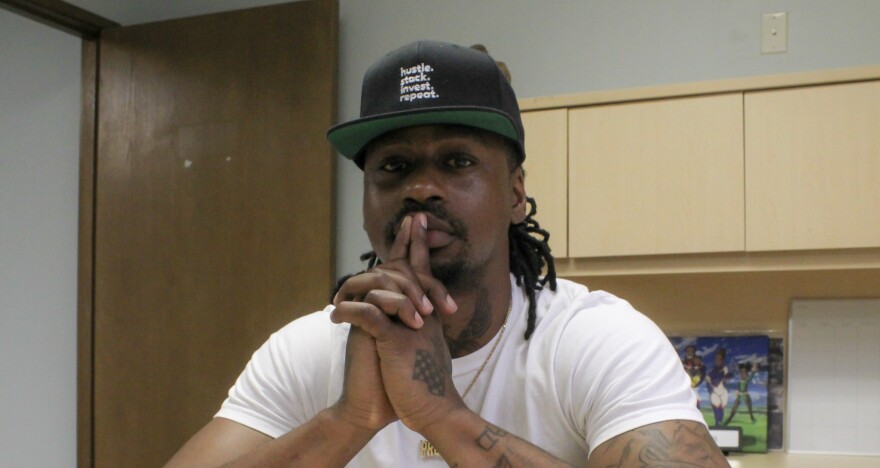As a teen, DéVonté Parson spent years in and out of juvenile detention. It didn’t keep him out of trouble. “I got into a gang brawl that turned into a shooting in Tacoma,” he said. He was 22.
Parson was arrested and put in jail. He was facing multiple felony assault charges which could amount to decades in prison. Parson waited more than a year for his trial. As he waited, he started to see a different future.
“When I was in there I’d see these younger individuals coming inside. My heart was going out to them because I was like, ‘I might not get out of this, but I’m hoping that you guys can potentially get out of it,'” he said.
So Parson began to encourage others who were in custody to come up with plans for after they were released. He started mentoring men not much younger than himself, and he noticed many weren’t being sent back to jail.
Seeing the difference he made to others, Parson realized he could advocate for himself, too. So he fired his lawyer and began reading up on the law. He even started borrowing John Grisham legal thrillers from the jail library to learn how to talk like a lawyer. Eventually, Parson pleaded guilty to lesser charges and was able to get his sentence reduced to six years.
That success inspired the name of his organization.
“'Pro Se' is to represent yourself in the court of law, so that’s why I chose ‘Pro Se Potential,’” Parson said.
Parson has shared his story in two books. And he said in the nearly five years since he founded Pro Se Potential, it has helped around 250 young people.
It's the mindset. We got to get them young, switch out the mindset and keep developing our people, and then we'll change the community in that way.DéVonté Parson, Pro Se Potential
The organization is based in King County, and is often called on to help people as young as 11. Parson said he’d like to get involved even earlier.
“There is a point for intervention, but we have to start being preventive,” Parson said.
He compared prevention to setting children on the right path from the beginning, rather than running into a house on fire to rescue them. He wants to start helping infants and toddlers.
“Where you’re catering to the moms and the dads and giving them the resources that they need," he said. "So by the time you're 11, 12, 13, you’ve already been touched by the village."
Interview Highlights
On a lack of father figures
I would say ninety-plus percent of [the fellow inmates he mentored] didn't have their dads. And my dad was murdered before I was born, so I understood that. And so having those conversations with them, I asked them, “How do you think this may have affected you?” And initially, they're like, “I don't see it. My mom did the best they could, or my grandma.” Well, imagine if your dad was there? Imagine he was a healthy father figure? What may have you not done? “Well actually, you know,” they said, "I might not have been out that late.”
How missing a father changed his early years
Coming up, I never realized that I needed a father, because all my friends didn't have dads. For me, I don't know the difference. But later on in life — I had maybe one year left in prison — I remember sitting on the bunk and tears coming out my eyes, and I'm sitting there [thinking] “God, I just wish I had a dad right now,” because I don't know who to talk to. I don't have a man that can give me understanding yet of life as a man. There's a whole part of me I don't get because he's dead.
On one young person he mentored
Young V, bro. I knew his auntie. She was like, “I know you've been doing this mentor stuff since you've been out of prison. My little nephew needs help.” I knew the whole story within 30 minutes. He got caught in school with a loaded gun in his locker, and nobody knew why. Coming from the streets, I know the reason. None of these young people are carrying guns because they just want to carry guns. They're scared. That's really what it is. They're hurt and they're scared. So when I talked to him [he said] “My best friend just got murdered, and they're looking for me.” I got in contact with the prosecutor's office. This is restorative justice at its finest. The prosecutor was like, “Okay, well, look, I won't charge him as long as he gets into school and graduates.” He's about to be 21 next month. And he graduated from school.
On working with other nonprofits
Let's build deep relationships with each other, authentic relationships with each other. Because where you do court advocacy, we do mentorship; they do case management, they do food access. If we all stay rocking with each other and have these deep relationships, then they have all the different resources they need.
This is the second installment of our series Agents of Change: Addressing Youth Violence — Lessons that Work.








